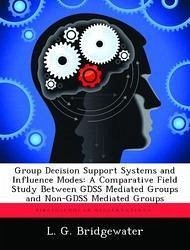This study examined the effect of Group Decision Support System (GDSS) technology on perceived influence modes. The researcher measured perceived influence modes in two group treatments: GDSS groups and non-GDSS (N-GDSS) mediated groups. Actual groups in both treatments performed judgmental tasks of their own choosing. Group members then completed a survey that measures their perceptions regarding five influence sources: expert influence, influence from legitimate authority, referent influence, reward influence, and coercive influence. The survey also measured the extent to which members perceived an "opportunity to influence" other group members. For each variable measured in both treatment groups, mean scores were calculated from respondents' ratings. Analysis indicated that GDSS technology significantly reduces the amount of influence perceived by group members when compared to members in N-GDSS groups. Results also indicated that there was no significant difference between treatment groups regarding members' perceived "opportunity to influence" other group members.








